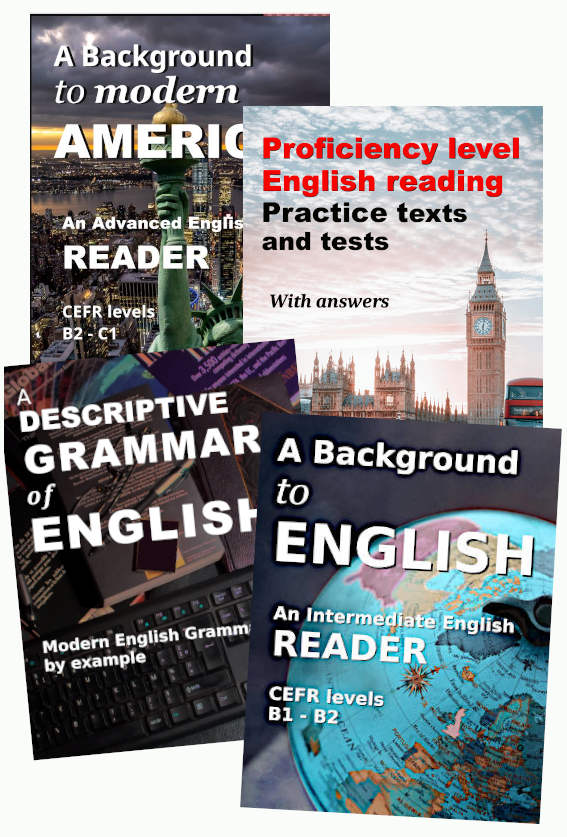You may also like: A2 basic English and CEFR level B1 - Preliminary English
From theory to practice, a teachers' and students' guide to "B2" level English
 Find B2 resources on Linguapress.com :
Easier B2 texts can be found in the intermediate
texts CEFR index, while longer or more complex B2 texts are listed in
the advanced
index.
Find B2 resources on Linguapress.com :
Easier B2 texts can be found in the intermediate
texts CEFR index, while longer or more complex B2 texts are listed in
the advanced
index.What does B2 English mean?
"B2" is one of six levels on the scale of foreign language proficiency set up by the Council of Europe. The Common European Framework of Reference for Languages, or CEFR, was established in 2001, after several years of discussion among language teaching experts from different countries. It is now generally accepted as the international yardstick for assessing a learner's level in a second or additional language.
A level of at least B2 in English is generally required for entry into higher education in English-speaking countries, and is also a prerequisite for many management level jobs worldwide.
As far as reading texts are concerned, a B2 grading applies to a range of texts verying from "high intermediate" level to "low advanced" level. As such, easier B2 texts can be found in the intermediate texts index, while longer or more complex B2 texts are listed in the advanced index.
B2 reading texts are sometimes subdivided into B2.1 level, and B2.2 level: the B2.1 categorisation refers essentially to shorter texts using shorter sentences.
According to the Council of Europe
Learners who achieve B2 Upper intermediate level have acquired the skills needed to....- understand the main ideas of complex text on both concrete and abstract topics, including technical discussions in his/her field of specialisation.
- interact with a degree of fluency and spontaneity that makes regular interaction with native speakers quite possible without strain for either party.
- produce clear, detailed text on a wide range of subjects and
- explain a viewpoint on a topical issue giving the advantages and disadvantages of various options.
But in concrete terms, what does that mean?
It means that learners must acquire the essential grammar and vocabulary of a language that will allow them to master these skills. The CEFR does not lay down a list of grammar and vocabulary for each language; it supposes that teachers and course-writers will know what is needed in order to achieve these goals.B2 = FCE or First Certificate
GRAMMAR
for B2 English
The user-friendly reference grammar recommended by leading specialist reviews
The user-friendly reference grammar recommended by leading specialist reviews

It is generally accepted that for English,
the B2 level can be certified by achieving at least a grade C score on
the Cambridge
First Certificate tests, commonly called FCE or B2 First
Other B2 certifications include:
►
Intermediate level on the Trinity GESE
tests,
►
At least 5.5 on the IELTS
scale.
►
A TOEFL score of at
least 87.
The B2 First examination requires a good grasp of essential English grammar, so here are the principal points of grammar that teachers need to teach, and students need to learn. Most of these points have already been introduced at A2 or B1 levels. At B2 level, it is a matter of developing them and alerting students to their use in more complex situations.
- Present tenses: Simple present, present continuous.
- Past tenses: Simple past, past continuous , present perfect, past perfect, used to / would for habits
- Future forms: will / shall, going to, use of present tenses to express future time.
- Conditional clauses (if and unless).
- Gerunds
- Passive forms
- Interrogative forms (questions)
- Count and non-count nouns, formation of nouns, plural nouns, determiners (articles, demonstratives, etc.)
- Adjective order, comparatives and superlatives, gradation of adjectives, use of general adverbs, adverbs of degree
- Main clauses and dependent clauses; relative clauses. Coordination and subordination
Verbs
Nouns and determiners
Adjectives and adverbs
Sentences
How to achieve B2 level in English?
There is no magic answer to this question, but there are a number of pathways to success.
While some students will want to learn, and some teachers to teach, long lists of vocabulary and grammar rules to be learned by rote, this is not generally the best way to learn a language. It is often part of the mix, and some students are happy learning words and grammar in this way; but others struggle.
As far as vocabulary is concerned, mastering English at B2 level normally requires an active vocabulary of at least 2,500 words, though most students will know more than this.
Languages are learned in a much deeper and more permanent way when they are acquired in context and by example; this means reading in English, which is the best way to acquire vocabulary, listening and talking which familiarise the learner with common expressions, collocations and different aspects of communication, and guided or unguided writing, which allows, or sometimes forces, students to use language creatively.
 Find B2 resources on Linguapress.com :
Easier B2 texts can be found in the intermediate
texts CEFR index, while longer or more complex B2 texts are listed in
the advanced
index. For easier texts see the elementary
index.
Find B2 resources on Linguapress.com :
Easier B2 texts can be found in the intermediate
texts CEFR index, while longer or more complex B2 texts are listed in
the advanced
index. For easier texts see the elementary
index.Website
and texts © Linguapress.com 2009 - 2025 except where otherwise
indicated
Contact: Use the form on our get in touch page
Contact: Use the form on our get in touch page




 Copyright
information.
Copyright
information.